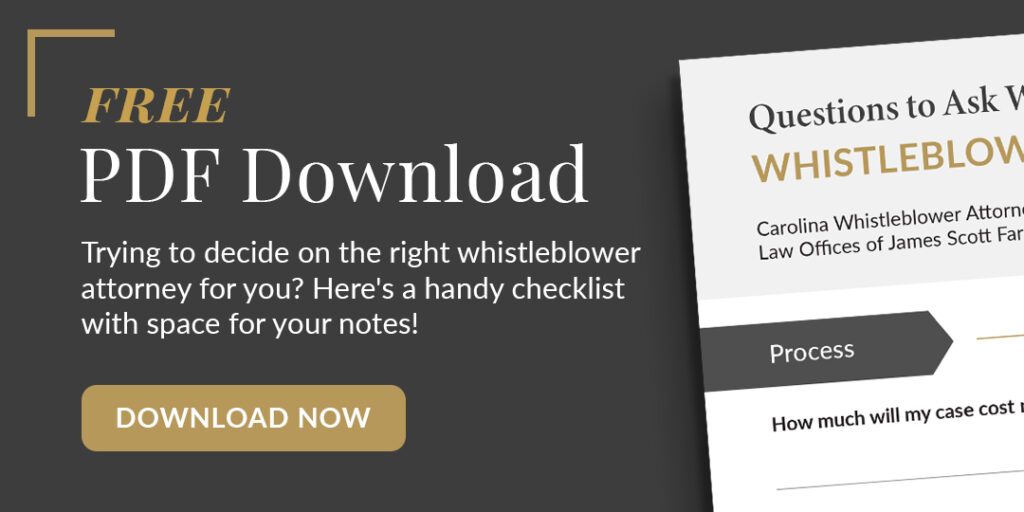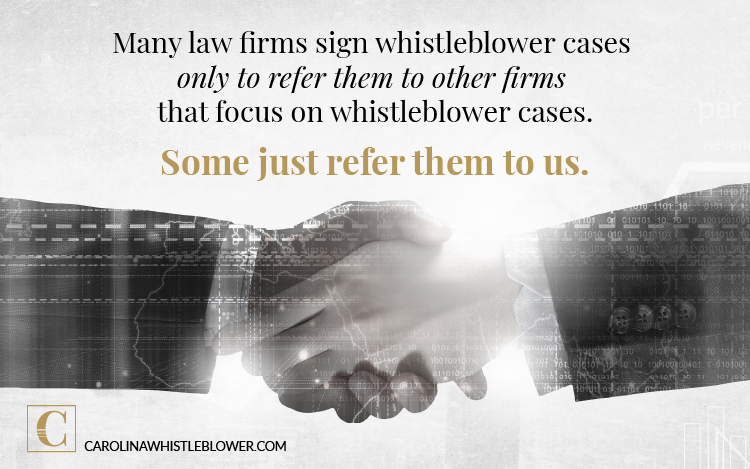When you suspect fraud against the government, everything boils down to two choices: you can stay quiet, or you can report it.
If you stay quiet, quit, or turn a blind eye, the fraud will likely continue. If you report it, the fraud may stop, and you may be rewarded. For those who decide they want to put an end to fraud, the journey begins with filing a whistleblower complaint.
But how exactly do you file a complaint?
The answer – as you probably imagined – can be complex, with many different choices to make at the very beginning, each with its own pros and cons. This article isn’t going to be a complete or definitive guide to whistleblower complaints, as there’s simply too much to cover. However, it can give you enough information to help you choose your next step.
Simplify the whistleblower process by calling 1-888-292-8852 for a free, confidential conversation with a knowledgeable attorney who can guide you every step of the way.
What kind of whistleblower complaint do you have?

In this article, I’ll draw on my years of experience as a whistleblower attorney to provide an overview of how complaints under the federal False Claims Act are filed. The False Claims Act is the most common whistleblower law used to expose fraud against the government.
What is the False Claims Act and does it apply in my case?
If government money was involved in the fraud in any way, you might consider contacting an attorney to see if you are eligible to file a whistleblower complaint under the federal False Claims Act. Whistleblower lawsuits brought under the False Claims Act are known as “qui tam” actions.
Note: Where government money is not involved, other government hotlines and resources may be available to help you report the fraud.
Do I need to have an attorney to file a whistleblower complaint under the False Claims Act?
Courts have overwhelmingly, if not unanimously, held that a whistleblower must be represented by an attorney to file a complaint under the False Claims Act. That’s because whistleblowers under the False Claims Act represent the interests of the government.
Although individuals can typically represent themselves in court, a lay person is not permitted to represent the interests of the government in court.
Stages in filing a whistleblower complaint under the False Claims Act
There are a few stages in a qui tam whistleblower claim, and each comes with its own rules and procedures. An experienced whistleblower attorney will be familiar with them. A misstep at any stage could hurt your claim – and make you ineligible for a potential whistleblower award.
Here are the 3 stages in filing a whistleblower complaint:
Stage #1: Filing the initial complaint
The whistleblower – known as a “relator” – must file a sealed complaint in federal court. The relator must also provide the government with a written disclosure of all the relevant information they have about the fraud. The relator’s lawyer submits a copy of the sealed complaint and written disclosure to the Attorney General of the United States and to the U.S. Attorney for the district in which the complaint is being filed.
These initial steps must be completed quickly and accurately in order to protect your best interests.

First, being the first to file can be an enormous advantage if multiple complaints are filed. The first to file a complaint is in the best position to receive a possible award.
Second, failing to properly initiate a False Claims Act lawsuit can stall your claim. This is why it is incredibly important to consult and, if needed, hire an experienced whistleblower attorney.
Standing out from the crowd
In addition to being timely and complete, your initial disclosure should be compelling. The goal is generally to have the government step in and take charge of your case. When the government participates in the case, it is much more likely to succeed.
However, a poor initial disclosure is unlikely to pique the government’s interest. After all, the government can only take on a limited number of whistleblower complaints each year. An experienced whistleblower attorney will know how to effectively present your evidence and claim to the government.
Stage #2: Investigation and your anonymity
Your whistleblower complaint, once filed, is typically sealed for at least 60 days. That is, the whistleblower’s case is typically not revealed to the party who committed or is committing the fraud while the government conducts an investigation.
Note: The government often seeks extensions on the 60-day deadline in order to fully investigate.
Once the complaint is filed and the investigation is concluded, the government must decide whether or not it is going to take over (or intervene in) the case. The government has exceptional power and enormous resources, and it can often get information and evidence that no one else can.
Remaining anonymous, and when your identity is revealed
While the case is sealed, your anonymity is preserved. Occasionally, the government will need to disclose the whistleblower’s identity during the sealed investigation. However, the False Claims Act contains powerful anti-retaliation provisions and whistleblower protections.
What will happen when your identity is finally revealed? What will you need to do during the investigation? An experienced whistleblower attorney can answer all your questions and prepare you for every step of the case.
And even if the government declines to take your case, it’s not necessarily over. You can often press forward with the case with a private attorney, which is something we have helped whistleblowers do many times.
Stage #3 Awards to the relator
As the whistleblower, you can receive up to 30% of the government’s recovery if your claim is successful. The exact amount depends on the circumstances of your possible case, how important your evidence was, whether the government intervened in the case, and so on.
Remember that the success of your case depends on the quality of your evidence and the information that you provide to the government. That also affects the value of the award you may receive.
How do you argue for the largest possible portion of the recovery as an award in a successful case? And if the government declined your case, but you pursued it successfully with your private attorney, how does that affect the amount of any reward?
Your whistleblower attorney can answer these questions and help you seek as much as possible for your courage in coming forward.
How to file a whistleblower retaliation complaint
Whistleblowers can be subjected to retaliation. Fortunately, there are whistleblower protections available under the law that your attorney can use to try to protect you.

Retaliation occurs in both obvious and more subtle ways. You may simply be fired or laid off. A second form of retaliation is keeping your job but being subjected to an “adverse action” by your employer. Anything the employer does that harms the whistleblower may be an adverse action.
Retaliation examples
Some examples of retaliatory action by an employer include:
- Demoting
- Denying overtime or a promotion
- Disciplinary action
- Denying benefits
- Failing to hire or rehire
- Intimidation or harassment
- Making threats
- Reassignment to a less desirable position, or actions affecting prospects for promotion (such as excluding an employee from training meetings)
- Reducing or changing pay or hours
- More subtle actions, such as isolating, ostracizing, mocking, or falsely accusing the employee of poor performance
- Blacklisting (intentionally interfering with an employee’s ability to obtain future employment)
- Constructive discharge (forced quitting when an employer makes working conditions intolerable due to the employee’s protected activity)
- Reporting or threatening to report an employee to the police or immigration authorities
Source: whistleblowers.gov
How can a lawyer assist you with your retaliation complaint?
To try to maximize your odds of success with your retaliation claim, it’s important that you gather and retain as much evidence as possible of the adverse action or alleged retaliation. Report retaliation to your whistleblower attorney, who should have experience handling retaliation claims.
Consult an experienced whistleblower attorney – free
Whistleblower laws take many forms and can be confusing. Don’t be intimidated, and don’t make a hasty decision. When you want to blow the whistle, call an experienced attorney before you do anything else.

At Carolina Whistleblower Attorneys, we offer a free, confidential case evaluation. That means it costs you nothing to contact us and discuss your case. Our You-First Policy ensures your best interests are always at the forefront.
Putting you first includes our contingency fee arrangement, which means it costs you nothing out-of-pocket to hire us. And we only collect a fee at all if we help you recover a whistleblower award.2
Our results speak for themselves

Our team has handled dozens of whistleblower cases and pursued them all the way to their conclusions.4 We know what the government wants to see and what can get them to join the complaint – adding their resources and help in pursuit of justice.
Many law firms sign whistleblower cases only to refer them to other firms that focus on whistleblower cases. Some just refer them to us.

We can help you understand your rights, help ensure that your complaint is filed correctly, do our best to safeguard your privacy, help you take advantage of whistleblower protection laws, and fight for your share of a possibly life-changing whistleblower reward in successful cases.
Call us confidentially at 1-888-292-8852 today, or contact us online. Remember not to use your work email or phone. We’ll give you clarity on your case at no cost and no obligation.
Frequently Asked Questions
FAQs
The following are questions about whistleblower reward laws and litigation that I am asked on a routine basis
How long do you have to file a whistleblower complaint?
How long you have to file a complaint depends on the type of complaint. Generally, False Claims Act violations have a filing deadline of six years from the when the violation occurred or three years from when the government knew or should have known about it, whichever occurs last. In no event can a case be brought more than 10 years after the violation.
Retaliation claims under the False Claims Act may not be brought more than 3 years after the date when the retaliation occurred.
Whistleblower complaints and whistleblower retaliation complaints may have different timing requirements. To accurately answer this question for your unique circumstances, you should speak with an attorney with experience in whistleblower cases.
Who can file a whistleblower complaint under the False Claims Act?
With rare exceptions, anyone with knowledge of fraud can file a whistleblower complaint. Under the False Claims Act, there aren’t really any special rules for federal employees, federal contractors, or people who work in a law enforcement agency, though there are specific rules regarding relators in the military. Whatever your situation, we encourage you to contact a whistleblower attorney before you make any decisions.
Note: Your national origin or citizenship status doesn’t matter. If you suspect fraud and are privy to private information supporting your claim, don’t hesitate to come forward.
What happens when you file a whistleblower complaint?
When we are contacted by a whistleblower, we follow five basic steps in the whistleblower process. Throughout this process, we work as quickly as possible to keep your identity hidden from your employer for as long as possible, try to protect you from retaliation, and use our experience to lobby the U.S. Attorney to take on your case.
Call 1-888-292-8852 for a free and confidential conversation and case evaluation.
Similar Articles
Hiring an Attorney | March 17, 2024
What Is a U.S. Attorney? And How a Former One Helps Your FCA Whistleblower Case
A U.S. attorney is a White House-appointed prosecutor and the top law enforcement officer for...
North Carolina Whistleblower | September 07, 2023
The Whistleblower Process in North and South Carolina: An Infographic
When people cheat the government, they are also cheating the taxpaying public that the government...
Government Fraud | July 28, 2023
What if the Government Decides Not to Pursue Your Whistleblower Case?
When a whistleblower files a qui tam lawsuit alleging fraud against the government, the Department...
Contact the Carolina
Whistleblower Attorneys
If you’re wondering if it’s a good idea to speak with a whistleblower lawyer about what you know, let us set the record straight.
- Corporate ethics hotlines can be risky and may lead to termination. If you’ve already done this, call us immediately.
- Your coworkers could be aware of the fraud – or complicit in it – and you should not talk to them about it.
- The first claim to be filed under the False Claims Act can proceed – if you’re not first, you’re at a serious disadvantage and may get nothing (another reason not to speak to your coworkers about it).
- A confidential discussion costs you a few minutes, but could save you time, stress, and money.
"*" indicates required fields
